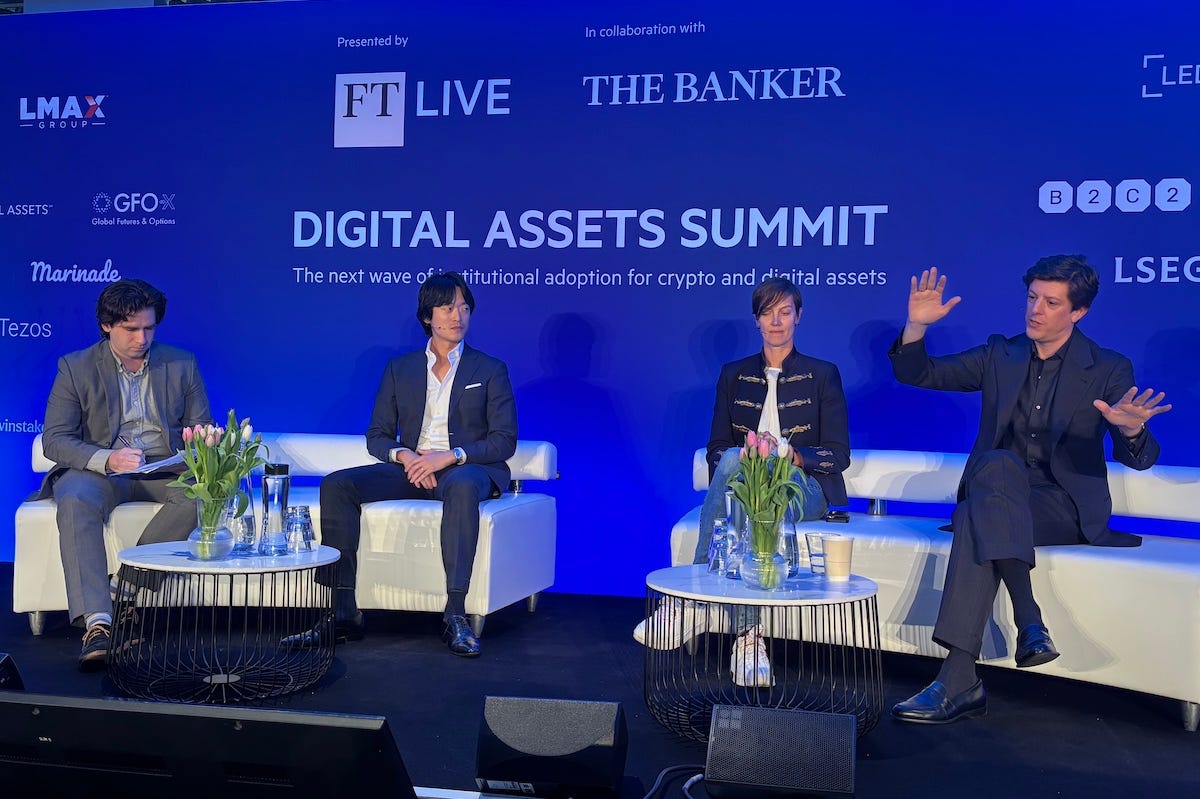Trump's Second-Term Crypto Agenda Sparks Global Industry Reactions
At a summit in London, digital asset leaders discussed the implications of Trump’s policies and the shifting global regulatory landscape

Since Donald Trump began his second term as U.S. President in January, the digital asset industry has watched Washington closely. While early actions have sparked optimism in parts of the sector, uncertainty remains over whether the administration can deliver on expectations.
Steve Lee, co-founder of Neoclassic Capital, offered a candid assessment: “I will give Trump an A plus on predictability. Other than that, what he’s done to the crypto industry didn’t meet the expectations of many crypto participants.”
Lee noted that announcements around Bitcoin reserves were “slightly conservative,” and broader regulatory actions have been “slower and less direct than people expected.”
Marieke Flament, an investor and former CEO of NEAR Foundation, characterized the administration’s crypto stance as mixed: “If we assume that the goal is to make crypto a trusted and investable asset class, there are some good, bad, and some ugly issues.”
She praised moves toward transparency and recent SEC appointments but warned about politicization.
“It’s the first time we’re seeing crypto so politicized, and that has global repercussions,” she said. “If you look at France, crypto is now a topic being taken up by the extreme right. I'm not sure that's good for anyone.”
Lloyd Wahed, CEO of Members Capital Management, said the impact varies by timeframe.
“Today, it’s a B+ for Trump’s first 100 days. It is probably incredibly good for companies such as Circle or Ripple. But over the next four years, it’s incredibly uncertain. We don’t know what way it’s going to go.”
He predicted long-term gains, saying, “In ten years, I’m pretty sure we’ll point to this period as when the big generational businesses come through.”
A Global Regulatory Ripple
These comments came during the Digital Assets Summit, hosted by FT Live in London on May 6–7. Panelists explored how Trump’s second term could influence crypto internationally.
Lee highlighted Asia’s dynamic response.
"Japan aims to lower the crypto gains' tax rate from 55% to 20%. In South Korea, institutions might be able to start trading crypto by the end of this year," he said.
"Hong Kong is more exchange-focused, and Singapore always tries to approve regulation that applies to many different verticals so that many global players can put their international hub in Singapore.”
Flament added, “We might also see very big government movements and innovation coming from other geographies. There is an appetite for different stablecoins, not just U.S. dollar stablecoins.”
She described this as part of a larger trend: “Sovereignty is now a word we hear often in this space.”
Wahed emphasized the role of human capital: “If you’re beginning your career, the Middle East offers huge opportunities from the large pool of capital and the innovative way the leadership is looking at investment.”
He also noted that despite volatility, “this administration has probably consolidated U.S. talent from leaving.”
New Use Cases, Old Reputations
Despite regulatory advances, reputational risks persist.
Flament warned, “It’s always an industry in which there is this shadow of, is this really serious, or is this whole thing just a gigantic Ponzi scheme?”
She expressed concern that headlines around Trump-branded tokens and crypto-linked financial gains could “put the industry back about five years or ten years.”
Lee pointed to risks around Bitcoin concentration. “Trump is very optimistic about Bitcoin, and only Bitcoin, so there is a risk in how he raised the money versus how he’s deploying it.”
Flament added that retail investors often treat firms like MicroStrategy as proxies: “Then find a way to let them participate in a way that is safe for everyone.”
Pragmatic Strategies for a Volatile Era
When asked how companies should respond, Lee emphasized staying grounded.
“Survival is everything. Crypto is all about surviving. If you survive multiple cycles, you will make the money.”
He advised backing “real entrepreneurs who are building real use cases” and urged investors to “diversify by geography and sector.”
Flament echoed that message. “When things are shaking around you, the best way to build businesses is to have a North Star and go for that, no matter what’s happening. If you continue to shift with the political winds, it’s a pretty good way to be derailed.”
Wahed concluded, “It’s a harder journey for mid-sized firms, but if you can prove you’re on the right side of this, you’ll come through stronger.”
The panelists agreed that discipline, clarity, and conviction will separate lasting ventures from fleeting speculation in an industry defined by cycles and now shaped by geopolitical forces.


